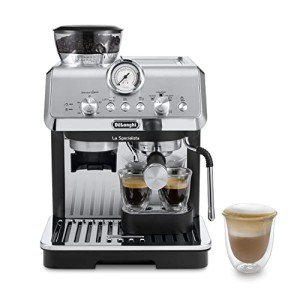A Look Into The Secrets Of Energy-Efficient Espresso Machines
Energy-Efficient Espresso Machines: A Comprehensive Guide
Worldwide of coffee lovers, espresso machines are typically concerned as necessary home appliances for developing rich, aromatic coffee. However, the energy usage connected with these machines can lead to increased energy costs and ecological issues. As customers end up being more eco-conscious, energy-efficient espresso machines have actually emerged as a popular option. This post intends to explore the functions, benefits, and alternatives available in energy-efficient espresso machines, assisting coffee enthusiasts make informed choices.
What Makes an Espresso Machine Energy-Efficient?
Energy-efficient espresso machines are created to minimize energy intake while maintaining ideal performance. Several functions contribute to the energy efficiency of these machines:
Insulation: High-quality insulation assists maintain heat, reducing the energy needed to preserve optimum brewing temperatures.
Smart Technology: Many modern machines are equipped with programmable settings that permit users to set up developing times and switch to standby mode when not in use.
Quick Heat-up Time: Energy-efficient espresso machines frequently use innovative heating innovations, such as thermoblocks or PID controllers, to heat water quickly.
Low Wattage: Machines that run at lower wattages take in less energy overall, making them more effective.
Automobile Shut-off: Automatic shut-off features ensure that the machine switches off after a certain duration of lack of exercise, further minimizing energy waste.
Advantages of Energy-Efficient Espresso Machines
Purchasing an energy-efficient espresso machine can provide a number of benefits:
Cost Savings: Over time, lower energy intake can lead to reduced electrical energy bills.
Environmental Impact: Using less energy decreases carbon footprints, making these machines a more sustainable choice for environmentally conscious consumers.
Enhanced Performance: Many energy-efficient models also use exceptional developing technologies, resulting in better-tasting espresso.
Sturdiness: Typically, energy-efficient machines are constructed with high-quality parts, leading to higher longevity.
Features to Consider
When selecting an energy-efficient espresso machine, several features need to be taken into consideration:
- Type of Machine: Options include manual, semi-automatic, and completely automatic designs, each with differing degrees of user control and automation.
- Brew Quality: Look for machines that use high-quality brewing systems to ensure optimum flavor extraction.
- Maintenance: Some machines have self-cleaning functions that can conserve energy and effort in maintenance.
- Capability: Depending on individual or household size, machine capability can impact energy intake, with larger machines typically requiring more power.
Popular Energy-Efficient Espresso Machines
The marketplace offers a variety of energy-efficient espresso machines catering to various needs and choices. Below are some notable models:
Brand
Model
Secret Features
Energy Consumption
Breville
Barista Express
Integrated grinder, PID temperature level control, fast heat-up.
Low
DeLonghi
EC155
Compact size, easy to use, durable develop.
Moderate
Rancilio
Silvia
Sturdy design, excellent temperature stability, and has a low environmental effect.
Moderate
Gaggia
Traditional
Dependable manual operation, long lasting brass parts, and effective steaming capability.
Low
Jura
E8
Completely automatic, smart functions, and a detachable brew group for easy cleansing.
Low
Tips for Optimal Energy Efficiency
Aside from choosing an energy-efficient design, customers can embrace a number of practices to take full advantage of energy effectiveness:
- Preheat: If your machine has a pre-heating function, use it to ensure that the ideal temperature level is reached rapidly before developing.
- Turn Off After Use: Always switch off the machine after developing or use machines with automobile shut-off functions.
- Routine Maintenance: Keep the machine well-kept to ensure it runs effectively and efficiently.
FAQs About Energy-Efficient Espresso Machines
1. Are energy-efficient espresso machines more costly?
While the initial financial investment may be greater for energy-efficient designs, the long-lasting savings on electricity expenses can balance out the preliminary expense. In addition, numerous energy-efficient machines included innovative features that improve the brewing experience.
2. How do I understand if an espresso machine is energy-efficient?
Search for indications such as Energy Star accreditation, user reviews, and requirements concerning wattage and heat-up time. Machines with particular features intended at minimizing energy consumption are usually created for better performance.
3. Can I use an energy-efficient espresso machine for other coffee designs?
Numerous energy-efficient espresso machines provide versatility, permitting users to brew various coffee styles beyond espresso, such as lattes and coffees, by integrating steaming abilities.
4. Do energy-efficient models compromise quality for efficiency?
Not always. Numerous energy-efficient espresso machines are equipped with high-quality brewing technology that can improve taste extraction while reducing energy usage.
5. What maintenance is required for energy-efficient espresso machines?
Routine maintenance includes cleaning the machine, descaling when necessary, and regularly inspecting seals and gaskets to ensure ideal efficiency and energy performance.
Energy-efficient espresso machines represent a perfect mix of performance, savings, and environmental duty. By considering different features, benefits, and brands, consumers can choose a design that suits their special choices while contributing positively to the environment. As prev toward sustainable living grows, the appeal of energy-efficient devices, consisting of espresso machines, is most likely to continue its upward trajectory, using coffee enthusiasts a guilt-free way to enjoy their everyday dose of espresso.
